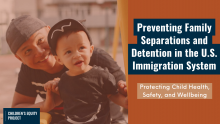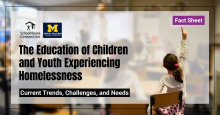0
Policy Brief
Community:
Mar 1, 2023
Social service programs are often looking for ways to assess and improve program design and implementation, and are increasingly using rapid learning methods to do so. In rapid learning cycles, programs try a new approach, see how well it works, make modifications to strengthen it, and then try it again. This brief illustrates how 10 fatherhood programs used learning cycles to evaluate one of three promising approaches to engaging men in their services, and the ways they used data in the learning cycle process to make decisions about the design and implementation of the approaches. Even outside of the learning cycle framework, programs may benefit from using data and the observations and reflections of participants and staff members to guide the implementation of program elements, as is illustrated in this piece.
Authored by: Keri West, Diego Quezada, Jonny Poilpré, and Rebecca Behrmann for Manpower Demonstration Research Corporation
Topics: Family engagement, Healthy homes, Research
 Shared by Sandra Ware
Shared by Sandra Ware
Sandra Ware posted a
on Jun 8, 2023
Keri West, Diego Quezada, Jonny Poilpré, and Rebecca Behrmann for Manpower Demonstration Research Corporation
Social service programs are often looking for ways to assess and improve program design and implementation, and are increasingly using rapid learning methods to do so.
0
Policy Brief
Community:
Mar 1, 2023
This document summarizes what was learned in SIRF (Strengthening the Implementation of Responsible Fatherhood Programs), which engaged 10 programs in using learning cycles—repeated periods of implementing ideas and reflecting on the results—to build evidence on practices to improve the enrollment, engagement, and retention of fathers in fatherhood programs.
Authored by: Charles Michalopoulos and Rebecca Behrmann for Strengthening the Implementation of Responsible Fatherhood Programs
Topics: Family engagement, Research
 Shared by Sandra Ware
Shared by Sandra Ware
Sandra Ware posted a
on Jun 8, 2023
Charles Michalopoulos and Rebecca Behrmann for Strengthening the Implementation of Responsible Fatherhood Programs
This document summarizes what was learned in SIRF (Strengthening the Implementation of Responsible Fatherhood Programs), which engaged 10 programs in using learning cycles—repeated periods of implementing ideas and reflecting on the results—to build evidence on practices to improve the enrollment, e
0
Policy Brief
Community:
Mar 1, 2023
Unfortunately, there are more youth experiencing homelessness than there are resources available. Up to 40% of youth experiencing homelessness identify as lesbian, gay, bisexual, transgender, and queer/questioning (LGBTQ+). Homelessness is often the result of multiple factors including historical and present systemic racism, discrimination, and socio-economic inequities. Learn more in our new policy brief.
Authored by: National Network for Youth
Topics: Criminal justice, Homelessness, Housing, Legislation & Policy, Mental health, Racial inequalities, Safety, Stability, Youth
 Shared by Sandra Ware
Shared by Sandra Ware
Sandra Ware posted a
on Jun 8, 2023
National Network for Youth
Unfortunately, there are more youth experiencing homelessness than there are resources available. Up to 40% of youth experiencing homelessness identify as lesbian, gay, bisexual, transgender, and queer/questioning (LGBTQ+).
0
Infographics
Community:
May 24, 2023
The unwinding of the Medicaid continuous coverage requirement represents the largest nationwide coverage transition since the Affordable Care Act, with significant health equity implications. As states restart eligibility redeterminations, millions of Medicaid enrollees will be at risk of losing their coverage with some portion exiting because they are no longer eligible, some losing coverage due to administrative challenges despite continued eligibility, and some transitioning to another source of coverage. Given the intense focus on coverage transitions during the unwinding, some states have initiated plans to publish a data dashboard to monitor progress. Data dashboards are useful for publishing dynamic data that is in high demand. They allow states to make proactive decisions about what data to release and on what schedule and then organize that data in an easy-to-digest visual format that facilitates the interpretation of key trends and patterns at a glance.
Authored by: Emily Zylla, Elizabeth Lukanen, and Lindsey Theis, SHADAC for State Health and Value Strategies
Topics: Affordable Care Act, Data sharing, Medicaid / Medicare
 Shared by Sandra Ware
Shared by Sandra Ware
Sandra Ware posted a
on May 25, 2023
Emily Zylla, Elizabeth Lukanen, and Lindsey Theis, SHADAC for State Health and Value Strategies
The unwinding of the Medicaid continuous coverage requirement represents the largest nationwide coverage transition since the Affordable Care Act, with significant health equity implications.
0
Policy Brief
Community:
Mar 28, 2023
Family separations and family detention have been used as part of immigration enforcement in the United States. These practices and policies are severely detrimental to child health and wellbeing and can cause lasting harm.
This brief reviews the state of the research on the developmental, psychological, and physical toll of family separation and family detention on children and their caregivers. Grounded in this science, we provide a set of policy recommendations that protect child health and wellbeing.
Authored by: Kelly Edyburn, PhD & Shantel Meek, PhD for the Children's Equity Project
Topics: Child welfare, Early childhood, Health, Immigrants, Legislation & Policy, Mental health, Youth
 Shared by Sandra Ware
Shared by Sandra Ware
Sandra Ware posted a
on Mar 30, 2023
Kelly Edyburn, PhD & Shantel Meek, PhD for the Children's Equity Project
Family separations and family detention have been used as part of immigration enforcement in the United States.
0
Infographics
Community:
Feb 7, 2023
An analysis of recent trends in child and youth homelessness that show the impact of the pandemic, including a disproportionate decline in enrollment and increase in chronic absenteeism.
Authored by: SchoolHouse Connection and University of Michigan
Topics: Attendance, COVID-19, Disabilities, Early childhood, Homelessness, Legislation & Policy, Racial inequalities, School-readiness, Youth
 Shared by Sandra Ware
Shared by Sandra Ware
Sandra Ware posted a
on Feb 21, 2023
SchoolHouse Connection and University of Michigan
An analysis of recent trends in child and youth homelessness that show the impact of the pandemic, including a disproportionate decline in enrollment and increase in chronic absenteeism.
0
Policy Brief
Community:
Nov 29, 2022
Successful diabetes care for vulnerable populations demands a multi-prong approach, deploying direct health interventions, medications, and support from a range of community resources to address the social determinants, which impact diabetes. This brief will highlight, through case studies and program descriptions, the important role of non-clinical staff in both the health center and housing setting to support individuals and families struggling to prevent and keep diabetes conditions under control.
Authored by: CSH
Topics: Health, Housing
 Shared by Sandra Ware
Shared by Sandra Ware
Sandra Ware posted a
on Nov 29, 2022
Successful diabetes care for vulnerable populations demands a multi-prong approach, deploying direct health interventions, medications, and support from a range of community resources to address the social determinants, which impact diabetes.
0
Policy Brief
Community:
Nov 3, 2022
The series highlights the promising work of the EHS-CCPs to date, particularly related to pandemic recovery and stabilization, workforce support, and expanding access to holistic support for children and families, especially mental health support. The briefs highlight the many roles that states can play in establishing and expanding their own EHS-CCPs, including by using Preschool Development Grant Birth to Five funding and aligning CCDF quality funding with supports needed to establish and grow the Early Head Start model.
The EHS-CCPs take many forms in states and communities across the country, but all provide resources to child care partners to deliver high-quality services aligned with the holistic Early Head Start model. This includes ensuring access to early learning for infants and toddlers; vision, hearing and developmental screenings; connections to health supports, including mental and dental healthcare; supports for families — including connections to prenatal care and economic, education, housing, and health supports; and coaching and access to credentials and higher levels of education for the workforce. In some states, the EHS-CCPs have prompted important policy changes that align standards across these two programs, reducing the burden for communities and providers.
Check out the full series here and help us spread the word!
Authored by: Mario Cardona, Shantel Meek, Linda Smith, Yvette Fuentes, and Eric Bucher for Arizona State University Center for Child and Family Success
Topics: Child welfare, COVID-19, Health, Mental health, Workforce development
 Shared by Sandra Ware
Shared by Sandra Ware
Sandra Ware posted a
on Nov 3, 2022
Mario Cardona, Shantel Meek, Linda Smith, Yvette Fuentes, and Eric Bucher for Arizona State University Center for Child and Family Success
The series highlights the promising work of the EHS-CCPs to date, particularly related to pandemic recovery and stabilization, workforce support, and expanding access to holistic support for children and families, especially mental health support.
0
Policy Brief
Community:
Sep 28, 2022
Approximately one in five adults reported experiencing household food insecurity in both spring 2020 and again in summer 2022, after a decline in reported food insecurity in spring 2021. High food price inflation, along with elevated costs for other basic needs, such as transportation and rent, have likely eroded food budgets in the last year. In addition, some of the safety net responses that buffered food insecurity in 2021 are no longer in place. In this brief, we use data from the Health Reform Monitoring Survey, a nationally representative survey of nonelderly adults, to assess food insecurity among households with nonelderly adults in March/April 2020, April 2021, and June 2022.
Authored by: Elaine Waxman, Julio Salas, Poonam Gupta, Michael Karpman for the Urban Institute
Topics: Food insecurity, Research, Stability
 Shared by Sandra Ware
Shared by Sandra Ware
Sandra Ware posted a
on Oct 27, 2022
Elaine Waxman, Julio Salas, Poonam Gupta, Michael Karpman for the Urban Institute
Approximately one in five adults reported experiencing household food insecurity in both spring 2020 and again in summer 2022, after a decline in reported food insecurity in spring 2021.
0
Policy Brief
Community:
Oct 12, 2022
Disabled individuals and families in federally assisted housing face multiple challenges in gaining access to housing units and services that meet their needs—despite legal frameworks meant to help them. This brief focuses on working-age disabled individuals and families with a disabled household member who live in federally assisted housing. It presents evidence of the challenges with federally assisted housing processes and supports for residents with disabilities, and provides recommendations that could help these processes and supports better meet legal obligations and resident needs.
Authored by: Corianne Payton Scally, Ebonie Megibow, Susan J. Popkin for the Urban Institute
Topics: Disabilities, Family engagement, Housing
 Shared by Sandra Ware
Shared by Sandra Ware
Sandra Ware posted a
on Oct 27, 2022
Corianne Payton Scally, Ebonie Megibow, Susan J. Popkin for the Urban Institute
Disabled individuals and families in federally assisted housing face multiple challenges in gaining access to housing units and services that meet their needs—despite legal frameworks meant to help them.
0
News Article
Community:
Jan 6, 2020
Scope of Practice article on the American Medical Association's website
Authored by: Tanya Albert Henry, American Medical Association
Topics: Cost effectiveness, Health
 Shared by Camille Anoll-Hunter
Shared by Camille Anoll-Hunter
Camille Anoll-Hunter posted a
on Aug 26, 2021
Tanya Albert Henry, American Medical Association
Scope of Practice article on the American Medical Association's website
0
Policy Brief
Community:
Jun 30, 2021
Every child in an early childhood setting should have a teacher with specialized education to promote that child’s cognitive, social, emotional, and physical development and who prepares them for success in school and in life. The National Research Council’s report from a panel of experts, Transforming the Workforce for Children Birth Through Age 8: A Unifying Foundation, lays out several recommendations for programs serving children from birth through age 8, notably that teachers "should have at a minimum a bachelor’s degree and specialization in the knowledge and competencies needed to serve as a care and education professional.
Authored by: Child Care Services Association & T.E.A.C.H.
Topics: Early childhood, Education, Post-secondary
 Shared by Kirsten Greenwell
Shared by Kirsten Greenwell
Kirsten Greenwell posted a
on Jun 30, 2021
Child Care Services Association & T.E.A.C.H.
Every child in an early childhood setting should have a teacher with specialized education to promote that child’s cognitive, social, emotional, and physical development and who prepares them for success in school and in life.
0
Policy Brief
Community:
May 5, 2021
In March 2020, the COVID-19 pandemic forced many public housing authorities (PHAs) to quickly adjust their operational procedures to protect their staff while providing emergency assistance to residents. Many PHAs had to close their offices and convert to remote operations almost overnight, while staff focused on supporting their tenants by delivering them food, doing wellness checks for vulnerable residents, and ensuring they had access to and in some cases providing the technology needed for children to attend school remotely and isolated residents to remain connected to friends, family, and service providers. Moreover, as the economic crisis caused by the pandemic worsened, PHAs were under pressure to rapidly adjust rents for tenants who had lost income and process housing choice voucher (HCV) applications so people could use their vouchers to find housing. This brief provides insights into how public housing authorities used additional flexibilities that became available through a series of HUD-issued regulatory and statutory waivers, and makes the case for the potential benefits for added flexibilities for the HCV and public housing programs going forward.
Authored by: Monique King-Viehl, Elizabeth Champion, & Susan J. Popkin for URBAN INSTITUTE
Topics: Advocacy, COVID-19, Data sharing, Health, Housing, Safety, Supportive housing
 Shared by Housing Is
Shared by Housing Is
Housing Is posted a
on May 25, 2021
Monique King-Viehl, Elizabeth Champion, & Susan J. Popkin for URBAN INSTITUTE
In March 2020, the COVID-19 pandemic forced many public housing authorities (PHAs) to quickly adjust their operational procedures to protect their staff while providing emergency assistance to residents.
0
Policy Brief
Community: Postsecondary
Nov 1, 2020
Colleges support students with advising, counseling, or coaching in academics and other skills they need to succeed in school. Some colleges enhance those services through reduced adviser caseloads and more comprehensive, frequent guidance, which can improve students’ semester-to-semester retention and average credits earned. This overview describes important lessons on designing and implementing those services. College leaders and administrators committed to designing, building, managing, and continually supporting enhanced advising services can consult this checklist of recommendations as they redesign or enhance these services — as stand-alone services or as part of multifaceted interventions.
Authored by: Andrea Vasquez & Susan Scrivener for MDRC
Topics: Attendance, Child welfare, Community development, Education, Grade-level proficiency, Post-secondary, Workforce development
 Shared by Housing Is
Shared by Housing Is
Housing Is posted a
on Mar 4, 2021
Andrea Vasquez & Susan Scrivener for MDRC
Colleges support students with advising, counseling, or coaching in academics and other skills they need to succeed in school.
0
News Article
Community: Youth
Feb 1, 2018
Chicago’s troubling homicide rate could be significantly reduced through a massive increase in state spending for Chicago schools. That's just one of the proposals floated Monday by a prominent University of Chicago economist Jens Ludwig. With a substantial commitment, he says homicides could be reduced by nearly 60 percent. Illinois is dead last when it comes to the percentage of education dollars provided by the state to its cities. Ludwig believes adding $1.7 billion dollars would not only bring Illinois up to the national average, but could substantially reduce gun violence as well. Given the social science evidence on the link between high school graduation and gun violence, that would be about a 30 percent decrease in the homicide rates in the city of Chicago for something that has absolutely nothing to do with the city of Chicago policies.
Authored by: FOX 32 CHICAGO
Topics: Child welfare, Community development, Education, Funding, Legislation & Policy, Preventative care, Youth
 Shared by Housing Is
Shared by Housing Is
Housing Is posted a
on Oct 15, 2020
Chicago’s troubling homicide rate could be significantly reduced through a massive increase in state spending for Chicago schools. That's just one of the proposals floated Monday by a prominent University of Chicago economist Jens Ludwig.
0
News Article
Community: Youth
Jun 29, 2017
One Summer Chicago Plus is a jobs program designed to reduce violence and prepare youth living in some of the city’s highest-violence neighborhoods for the labor market. This study was carried out over the summer of 2013 in partnership with the Chicago Department of Family and Support Services. It found that the program, which provided a six-week, minimum-wage job for 25 hours a week, reduced the number of violent-crime arrests for participants by 33 percent over the subsequent year. The One Summer Chicago Plus 2013 study—accompanied by a long-term follow-up of the 2012 program—closely examines the two to three years following the six-week program and finds that the reduction in violent-crime arrests is not driven simply by keeping participants off the streets during the summer. In fact, the decline in violence remains significant when the summer is ignored entirely.
Researchers did find, however, that the program had no significant impacts on schooling outcomes or engagement, nor did it have a positive impact on formal labor sector employment for all of the participants after the fact. The authors do note that it is possible that significant labor market effects will develop past the three-year window examined in the study.
Authored by: UNIVERSITY OF CHICAGO URBAN LABS
Topics: Child welfare, Community development, Criminal justice, Out-of-school time, Partnerships, Preventative care, Safety, Youth
 Shared by Housing Is
Shared by Housing Is
Housing Is posted a
on Oct 15, 2020
UNIVERSITY OF CHICAGO URBAN LABS
One Summer Chicago Plus is a jobs program designed to reduce violence and prepare youth living in some of the city’s highest-violence neighborhoods for the labor market. This study was carried out over the summer of 2013 in partnership with the Chicago Department of Family and Support Services.
0
Policy Brief
Community:
Dec 4, 2019

In California, more than 3.7 million students were eligible for free or reduced priced school meals in the 2017-2018 school year. For many of those students, school meals are the primary source of regular access to healthy food. When the bell rings at 3:00 or lets out for summer break, many of those students go home to nutritional uncertainty or high-calorie, low-nutrient foods.
For many low-income families, the out-of-school-time food access gap increases family stress: limited budgets are stretched further to cover food, rent, utilities, transportation, medications, and chidcare costs. For very young children, food insecurity can negatively impact brain and physical development. For children of all ages, disrupted access to healthy food can impact behavior, increase risk of obesity, make it harder to concentrate, or exacerbate existing healthy conditions like type 2 diabetes. The impact is not limited to summer, and can lead to a rocky start to the school year, negatively impacting school attendance and students’ ability to effectively participate in school.
Read the full brief to learn how public and affordable housing communities can address food insecurity for children and youth with the help of out-of-school-time USDA child nutrition programs.
Authored by:
Topics: Advocacy, Early childhood, Food insecurity, Health, Healthy homes, Housing, Legislation & Policy, Low-income, Nutrition, Out-of-school time, West Coast, Youth
 Shared by Linda Lu
Shared by Linda Lu
Linda Lu posted a
on Dec 4, 2019
In California, more than 3.7 million students were eligible for free or reduced priced school meals in the 2017-2018 school year. For many of those students, school meals are the primary source of regular access to healthy food.
0
Policy Brief
Community:
Jun 4, 2019
The Department of Housing and Urban Development (HUD) has announced its intention to roll back protections for transgender people experiencing homelessness. The newly proposed rule, which is in the early stages of the rulemaking process and has not yet been publicly posted to the Federal Register, would allow homeless shelters to discriminate based on gender identity, putting transgender people in danger of violence and further housing instability. This is part of a long string of attacks the Trump administration has directed toward the transgender community, such as implementing the infamous military ban, contributing to a pattern that legally perpetuates discrimination against transgender people in this country.
Authored by: Aastha Uprety for Equal Rights Center
Topics: Health, Homelessness, Housing, Legislation & Policy, Racial inequalities
 Shared by Housing Is
Shared by Housing Is
Housing Is posted a
on Jun 13, 2019
Aastha Uprety for Equal Rights Center
The Department of Housing and Urban Development (HUD) has announced its intention to roll back protections for transgender people experiencing homelessness.
0
News Article
Community:
Jun 12, 2019
About half of the student body at one Ohio elementary school has witnessed drug use at home. Educators spend time every day teaching the children how to cope.
Authored by: Dan Levin for The New York Times
Topics: Child welfare, Early childhood, Education, Health, Substance abuse, Youth
 Shared by Housing Is
Shared by Housing Is
Housing Is posted a
on Jun 13, 2019
Dan Levin for The New York Times
About half of the student body at one Ohio elementary school has witnessed drug use at home. Educators spend time every day teaching the children how to cope.
0
News Article
Community:
Jun 9, 2019
When applications opened for New York City’s first affordable housing property for LGBTQ older adults recently, 1,000 people eagerly sent theirs in on that first day.
Authored by: Grace Birnstengel for Forbes
Topics: East Coast, Homelessness, Housing, Low-income, Seniors
 Shared by Housing Is
Shared by Housing Is
Housing Is posted a
on Jun 13, 2019
Grace Birnstengel for Forbes
When applications opened for New York City’s first affordable housing property for LGBTQ older adults recently, 1,000 people eagerly sent theirs in on that first day.
0
News Article
Community:
Jun 10, 2019
More than a half million renters have been evicted in Los Angeles County over the past eight years, according to a new report by Public Counsel and the UCLA School of Law that calls on county supervisors to adopt permanent rent control measures.
Authored by: Jenna Chandler for Curbed Los Angeles
Topics: Homelessness, Housing, Legislation & Policy, Low-income, Research, West Coast
 Shared by Housing Is
Shared by Housing Is
Housing Is posted a
on Jun 13, 2019
Jenna Chandler for Curbed Los Angeles
More than a half million renters have been evicted in Los Angeles County over the past eight years, according to a new report by Public Counsel and the UCLA School of Law that calls on county supervisors to adopt permanent rent control measures.
0
News Article
Community:
Recognizing that the aging of its population will reshape housing needs, the city of Washington, DC, has fostered numerous options for older residents, including some that are intentionally multigenerational.
Authored by: PD&R Edge Online Magazine
Topics: Early childhood, Family engagement, Housing, Low-income, Seniors, Youth
 Shared by Housing Is
Shared by Housing Is
Housing Is posted a
on Jun 11, 2019
PD&R Edge Online Magazine
Recognizing that the aging of its population will reshape housing needs, the city of Washington, DC, has fostered numerous options for older residents, including some that are intentionally multigenerational.
0
News Article
Community:
Jun 5, 2019
In the United States, more than 2.7 million grandparents report that they’re primarily responsible for their grandchildren under 18. The problem is many are struggling with food insecurity because of federal rules and regulations.
Authored by: Marie C. Gualtieri for Next Avenue
Topics: Child welfare, Food insecurity, Legislation & Policy, Low-income, Nutrition
 Shared by Housing Is
Shared by Housing Is
Housing Is posted a
on Jun 11, 2019
Marie C. Gualtieri for Next Avenue
In the United States, more than 2.7 million grandparents report that they’re primarily responsible for their grandchildren under 18. The problem is many are struggling with food insecurity because of federal rules and regulations.
0
News Article
Community:
Jun 5, 2019
Patients are dealing with stress related to the social determinants of health, including stable housing, food security, and adequate transportation.
Authored by: Jessica Kent for Health IT Analytics
Topics: Food insecurity, Health, Housing, Low-income, Nutrition, Transportation
 Shared by Housing Is
Shared by Housing Is
Housing Is posted a
on Jun 11, 2019
Jessica Kent for Health IT Analytics
Patients are dealing with stress related to the social determinants of health, including stable housing, food security, and adequate transportation.
0
Infographics
Community:
Breakdown by state
Authored by: Center on Budget and Policy Priorities
Topics: Homelessness, Housing, Immigrants, Legislation & Policy
 Shared by Housing Is
Shared by Housing Is
Housing Is posted a
on Jun 7, 2019
Center on Budget and Policy Priorities


 Shared by Sandra Ware
on Jun 8, 2023
Shared by Sandra Ware
on Jun 8, 2023


 Shared by Sandra Ware
on Jun 8, 2023
Shared by Sandra Ware
on Jun 8, 2023


 Shared by Sandra Ware
on Jun 8, 2023
Shared by Sandra Ware
on Jun 8, 2023


 Shared by Sandra Ware
on May 25, 2023
Shared by Sandra Ware
on May 25, 2023


 Shared by Sandra Ware
on Mar 30, 2023
Shared by Sandra Ware
on Mar 30, 2023


 Shared by Sandra Ware
on Feb 21, 2023
Shared by Sandra Ware
on Feb 21, 2023

 Shared by Sandra Ware
on Nov 29, 2022
Shared by Sandra Ware
on Nov 29, 2022
 Shared by Sandra Ware
on Nov 3, 2022
Shared by Sandra Ware
on Nov 3, 2022
 Shared by Sandra Ware
on Oct 27, 2022
Shared by Sandra Ware
on Oct 27, 2022
 Shared by Sandra Ware
on Oct 27, 2022
Shared by Sandra Ware
on Oct 27, 2022
 Shared by Camille Anoll-Hunter
on Aug 26, 2021
Shared by Camille Anoll-Hunter
on Aug 26, 2021
 Shared by Kirsten Greenwell
on Jun 30, 2021
Shared by Kirsten Greenwell
on Jun 30, 2021
 Shared by Housing Is
on May 25, 2021
Shared by Housing Is
on May 25, 2021
 Shared by Housing Is
on Mar 4, 2021
Shared by Housing Is
on Mar 4, 2021
 Shared by Housing Is
on Oct 15, 2020
Shared by Housing Is
on Oct 15, 2020
 Shared by Housing Is
on Oct 15, 2020
Shared by Housing Is
on Oct 15, 2020

 Shared by Linda Lu
on Dec 4, 2019
Shared by Linda Lu
on Dec 4, 2019

 Shared by Housing Is
on Jun 13, 2019
Shared by Housing Is
on Jun 13, 2019

 Shared by Housing Is
on Jun 13, 2019
Shared by Housing Is
on Jun 13, 2019


 Shared by Housing Is
on Jun 13, 2019
Shared by Housing Is
on Jun 13, 2019

 Shared by Housing Is
on Jun 13, 2019
Shared by Housing Is
on Jun 13, 2019

 Shared by Housing Is
on Jun 11, 2019
Shared by Housing Is
on Jun 11, 2019

 Shared by Housing Is
on Jun 11, 2019
Shared by Housing Is
on Jun 11, 2019

 Shared by Housing Is
on Jun 11, 2019
Shared by Housing Is
on Jun 11, 2019
